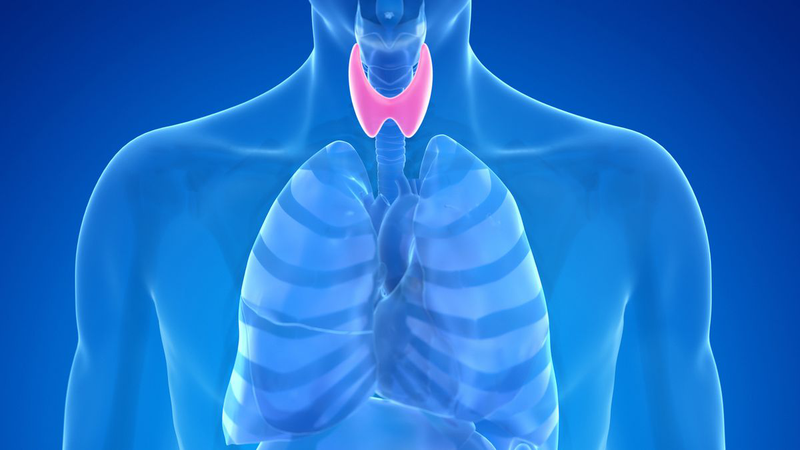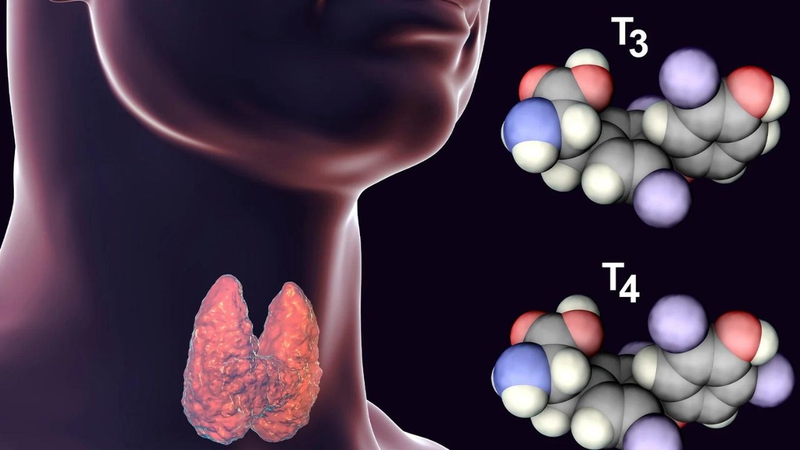We have certainly all heard of the thyroid gland at least once, but not everyone understands this organ clearly. This is one of the “small but powerful” organs of the endocrine system in the body, taking on many important functions through hormones secreted from the thyroid gland. The following article will provide detailed information about the types of thyroid hormones and their specific functions.
A few features of the thyroid gland
The thyroid gland is known as the largest endocrine gland in the body. This organ plays many important roles that determine the metabolic process. The thyroid gland is located in the front of the neck between the trachea and the larynx, weighing about 10 to 20 grams.

The thyroid gland plays an important role in most of the body’s activities.
The thyroid gland has a shape similar to a bow or a butterfly with 2 lobes connected by the thyroid isthmus. In normal condition, we cannot observe or feel this organ from the outside. This is where hormones are produced and stored to help regulate the body’s metabolism. Therefore, when the hormones secreted from the thyroid gland are too much or too little, it can lead to health problems.
2 hormones secreted from the thyroid gland
Thyroid hormones (thyroid hormones) secreted by the thyroid gland play a particularly important role in the body’s development and energy metabolism. All cells in our body are affected by thyroid hormones to regulate metabolism.
In normal people, the thyroid gland produces 2 types of hormones including Thyroxin (T4) and Triiodothyronine (T3). These 2 types of hormones are produced in the follicular epithelial cells of the thyroid gland. Of which, T4 hormone accounts for 80%, the remaining 20% is T3 hormone. However, although produced in small amounts, T3 hormone has a 4 times stronger effect than T4 hormone. Therefore, T4 hormone can be converted into T3 hormone to function thanks to the action of some enzymes in the liver and kidneys.

T3 and T4 are two hormones produced by the thyroid gland.
Functions of hormones secreted from the thyroid gland for the body
The hormones secreted from the thyroid gland all play an important role. If there is a lack or excess of thyroid hormones, it will affect the development of the body, even causing many dangerous diseases. Thyroid hormones affect metabolism and most organ systems in the body, including:
- Carbohydrate metabolism: Thyroid hormones will increase the ability of cells to receive glucose and increase the synthesis of glucose from non-carbohydrate substances.
- Fat metabolism: Thyroid hormones stimulate the breakdown of fat and increase the number of free fatty acids. Therefore, they will simultaneously enhance the oxidation of fatty acids inside the cells.
- Metabolic rate: If the thyroid gland does not produce enough hormones, it will severely reduce the metabolic rate in the body.
- Effects on the amount of fat in the blood and liver: Fat reserves in the liver will increase if the body reduces the secretion of thyroid hormones. On the contrary, if thyroid hormones increase, cholesterol, phospholipids and triglycerides in the blood will decrease.
- Affects the cardiovascular system: Hormones secreted from the thyroid gland can increase heart rate, breathing rate, oxygen consumption and increase mitochondrial activity. Simply put, they help increase blood flow and body temperature.
- Affects the nervous system: Thyroid hormones T3 and T4 help enhance brain activity, development and perfection of the nervous system.
- Affects the digestive system: Thyroid hormones affect the secretion of digestive juices and peristalsis in the stomach and intestines.
- Affects the reproductive system: Menstrual cycle, sexual desire, and fertility are all affected by hormones produced by the thyroid gland.
What problems does an imbalance of thyroid hormones cause?
Thyroid hormones play a very important role but need to be maintained at a stable level. An imbalance of thyroid hormones (excess or deficiency) will cause abnormalities in the body. The most common of these are hyperthyroidism and hypothyroidism.

Thyroid gland develops abnormally in hyperthyroidism
When the thyroid gland is overactive, it leads to excess hormones, causing hyperthyroidism. People with hyperthyroidism often experience sudden weight loss, fatigue, shortness of breath, bulging eyes, difficulty sleeping, sensitivity to light, thinning hair, difficulty concentrating, abnormally fast heart rate, etc. In addition, the patient can also feel the thyroid gland due to its larger growth.
In contrast to excess hormones, when the thyroid gland does not produce enough necessary hormones, it leads to hypothyroidism. This disease is completely opposite to hyperthyroidism, so the symptoms are also the opposite. People with hypothyroidism often gain weight quickly even though they do not eat much, have memory loss, pale skin, sluggish body, decreased body temperature, decreased heart rate, frequent drowsiness, dry hair, little urination, constipation, irregular menstruation, decreased sexual function, etc.
In short, maintaining the stability of hormones secreted from the thyroid gland plays an important role. Therefore, regularly check your thyroid to detect thyroid hormone imbalance early, thereby having timely intervention plans.





